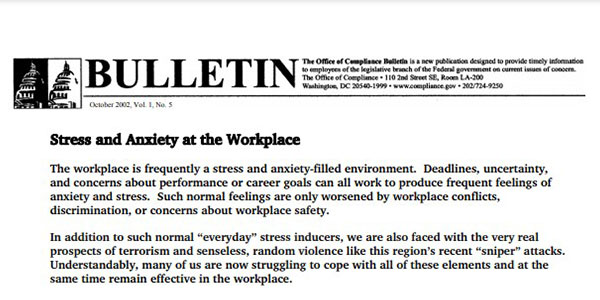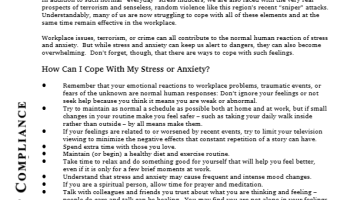The workplace is frequently a stress and anxiety-filled environment. Deadlines, uncertainty, and concerns about performance or career goals can all work to produce frequent feelings of anxiety and stress. Such normal feelings are only worsened by workplace conflicts, discrimination, or concerns about workplace safety.
In addition to such normal “everyday” stress inducers, we are also faced with the very real prospects of terrorism and senseless, random violence like this region’s recent “sniper” attacks. Understandably, many of us are now struggling to cope with all of these elements and at the same time remain effective in the workplace.
Workplace issues, terrorism, or crime can all contribute to the normal human reaction of stress and anxiety. But while stress and anxiety can keep us alert to dangers, they can also become overwhelming. Don’t forget, though, that there are ways to cope with such feelings.
How Can I Cope With My Stress or Anxiety?
- Remember that your emotional reactions to workplace problems, traumatic events, or fears of the unknown are normal human responses: Don’t ignore your feelings or not seek help because you think it means you are weak or abnormal.
- Try to maintain as normal a schedule as possible both at home and at work, but if small changes in your routine make you feel safer – such as taking your daily walk inside rather than outside – by all means make them.
- If your feelings are related to or worsened by recent events, try to limit your television viewing to minimize the negative effects that constant repetition of a story can have.
- Spend extra time with those you love.
- Maintain (or begin) a healthy diet and exercise routine.
- Take time to relax and do something good for yourself that will help you feel better, even if it is only for a few brief moments at work.
- Understand that stress and anxiety may cause frequent and intense mood changes.

